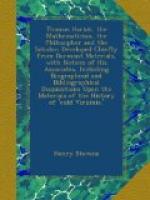Title: Thomas Hariot
Author: Henry Stevens
Release Date: February, 2004 [EBook #5171] [Yes, we are more than one year ahead of schedule] [This file was first posted on May 28, 2002]
Edition: 10
Language: English
Character set encoding: ASCII
*** Start of the project gutenberg EBOOK, Thomas Hariot ***
This eBook was produced by Norm Wolcott.
Thomas Hariot ------------------------------------------------------------
-------------
[Redactor’s note: Very little is known of Thomas Hariot; his only published works are the ‘Briefe and true report’ (pg#4247) and the posthumous ‘Praxis’, a handbook of algebra. He anticipated the law of refraction, corresponded with Kepler, observed comets, and may have been the first to recognize that the straight line paths of comets might be segments of elongated ellipses. The lost ‘ephemera’ referred to in the text have since been found (since 1876) and a conference was held in 1970 at the University of Delaware on the current state of Hariot research, the proceedings of which have been published by the Oxford University Press, where one may find a fairly current view of the historical record. Due to the large number of quotations and early english typography, the casual reader may find the ‘html’ version easier to follow than the text version.]
-------------------------------------------------------
------------------ Thomas Hariot the mathematician the philosopher and the scholar developed chiefly from dormant materials with notices of his associates including biographical and bibliographical DISQUISITIONS upon the materials of the history of ’Ould Virginia’
By Henry Stevens of Vermont
-------------------------------------------------------
------------------ Premonition
When I years ago undertook among other enterprises to compile a sketch of the life of Thomas Hariot the first historian of the new found land of Virginia; and to trace the gradual geographical development of that country out of the unlimited ‘Terra Florida’ of Juan Ponce de Leon, through the French planting and the Spanish rooting out of the Huguenot colony down to the successful foothold of the English in Wingandacoa under Raleigh’s patent, I little suspected either the extent of the research I was drifting into, or the success that awaited my investigations.




